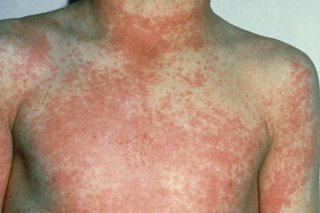Parents, grandparents and others who care for children are being urged to look out for the symptoms pf scarlet fever following a big increase in the number of case reported this year.
Scarlet fever mainly affects young children but can also be contracted by adults. It is a very contagious seasonal bacterial illness which, although not usually serious, can sometimes lead to complications if not diagnosed and treated.
 Latest figures just published by Pubic Health England (PHE) show 20,372 cases of scarlet fever reported since mid-September 2017. That compares to an average of 9,461 cases for the same period over the past five years, meaning this year’s cases have more than doubled. There were 1,180 cases reported for the most recent week covered by the latest figures (April 2nd to 8th, 2018).
Latest figures just published by Pubic Health England (PHE) show 20,372 cases of scarlet fever reported since mid-September 2017. That compares to an average of 9,461 cases for the same period over the past five years, meaning this year’s cases have more than doubled. There were 1,180 cases reported for the most recent week covered by the latest figures (April 2nd to 8th, 2018).
Dr Nick Phin, Deputy Director of National Infection Service at PHE, said: “We are urging parents to look out for the symptoms of scarlet fever, such as a sore throat, fever and rash, after seeing a significant upsurge in cases this year. The good news is that over the Easter holidays we saw a slight decline in cases, which may indicate that activity has peaked.
“Scarlet fever, which mainly affects young children, is not usually a serious illness and can be easily treated with the appropriate antibiotics. We encourage parents to contact their GP or NHS 111 if they spot symptoms of scarlet fever or have concerns.”
The peak season for scarlet fever is between Autumn and Spring, and this year’s later-than-usual Spring could go some way to explaining the upsurge in cases. It is usually a mild illness and gets its name from the characteristic fine pinkish or red rash with a sandpapery feel. Other symptoms include a sore throat, headache and fever.
Early treatment with antibiotics is important and can help reduce the risk of complications, such as pneumonia, and the spread of the contagious infection. Children or adults diagnosed with scarlet fever are advised to stay at home until at least 24 hours after the start of antibiotic treatment, to avoid spreading the infection to others.
Dr Phin added: “It’s not uncommon to see a rise in cases of scarlet fever at this time of year. We are monitoring the situation closely and remind parents to be aware of the symptoms of scarlet fever and to contact their GP for assessment if they think their child might have it. Whilst there has been a notable increase in scarlet fever cases when compared to last season, greater awareness and improved reporting practices may have contributed to this increase.”
Professor Helen Stokes-Lampard, Chairwoman of the Royal College of GPs, said: “Scarlet fever is a very contagious disease and much more common in children under 10 than teenagers or adults, but it can be treated quickly and effectively with a full course of antibiotics and all GPs are trained to diagnose and treat it.
“Scarlet fever used to be a lot more common than it is now, but GPs are noticing more cases than in previous years at the moment. If a patient thinks that they, or their child, might have symptoms, they should seek medical assistance.”
● For more information on scarlet fever and the symptoms to look out for, visit the NHS Choices website by clicking here.
